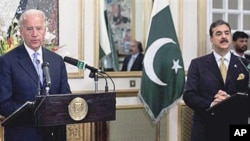U.S Vice President Joe Biden has urged Pakistan to fight growing religious extremism and has tried to dispel what he called common anti-American misperceptions in the predominantly Muslim country. The visiting U.S leader made the comments after talks with Pakistani leaders in Islamabad.
Speaking alongside Prime Minister Yousef Gilani, Vice President Joe Biden told a news conference that the United States and Pakistan have forged an enduring partnership against extreme ideologies.
But he rejected criticism about the U.S. role in Pakistan and said the U.S. has not imposed its anti-terror war on Pakistan. Biden said that since attacking the United States in September of 2001, al-Qaida-linked violent extremists still pose a threat not just to the United States but to Pakistan and to the entire civilized world.
"And they have, not with your [the government] help, but they have found refuge in some of the most remote portions of your country,” Biden said. “As Pakistanis have wondered whether or not we are part of the problem instead of the solution, al-Qaida has worked with extremist allies who have had you as a target and your people as a target, maiming and murdering thousands of Pakistani security forces and ordinary citizens."
U.S officials believe al-Qaida fighters hiding in Pakistan's North Waziristan tribal region are involved in cross-border attacks on NATO-led international forces in Afghanistan.
Western intelligence agencies are also said to have found links between extremists based in the lawless Pakistani region and terror suspects detained in the United States and European countries.
Vice President Biden also tried to counter anti-U.S conspiracy theories commonly heard in Pakistan, saying they are dead wrong. He said that the United States does not favor neighboring India at Pakistan's expense, it does not want to break up the Muslim nation and Washington is not at war with Islam.
"The assertion that we disrespect Islam is actually quite the opposite,” Biden explained. “Islam is the fastest growing religion in the United States of America… We are not the enemies of Islam and we embrace those who practice that great religion in our country."
Biden also condemned this month's assassination of the governor of the Pakistani province of Punjab, Salman Taseer, for supporting reforms in the country's anti-blasphemy law. "The governor was killed simply because he was a voice for tolerance and understanding. To state the oblivious there is no justification non for such senseless acts. As you know all too well… societies that tolerate such action end up being consumed by those actions," he said.
The high-profile Pakistani politician was killed earlier this month by one of his own security guards. Religious parties across the country have held big demonstrations in recent days to praise the killer. They also warned those seeking reforms in the anti-blasphemy law that calls for death penalty for anyone found guilty of insulting the Prophet Mohammad.
Just hours after U.S Vice President Joe Biden spoke in Islamabad a suicide car bomber struck a police station in a northwestern Pakistani town of Bannu, killing more than a dozen security personnel.
Biden says a $7.5-billion U.S aid package for Pakistan over the next five years is an expression of Washington's support to the efforts Pakistani government is making to bring political and economic stability to the country. As he put it, a close partnership with Pakistan and its people is in the vital self-interests of both the countries.




